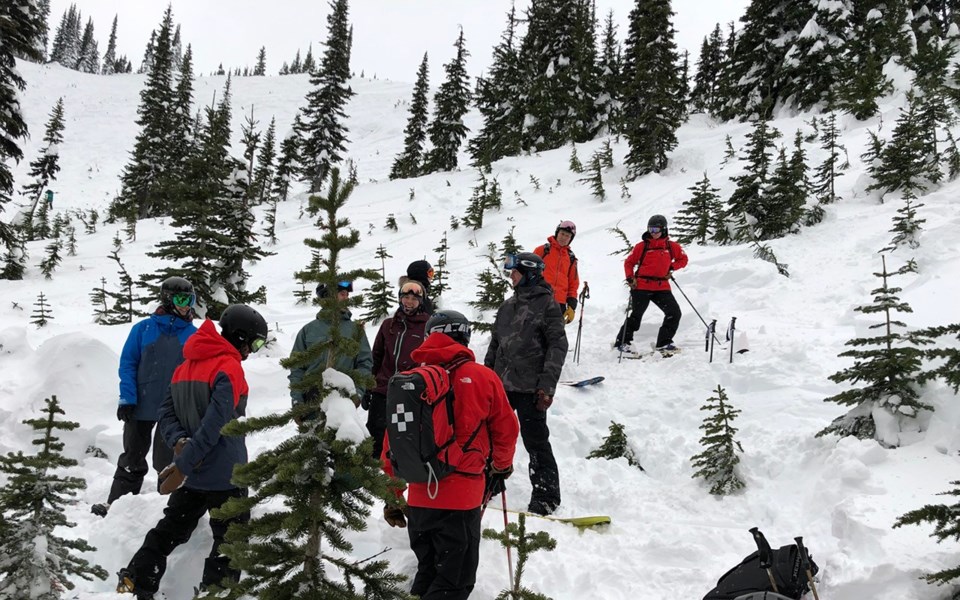Being active in search and rescue for eight years (involving some 250 emergency tasks), Michael Gigliotti has had brushes with death before鈥攂ut none like the one he experienced on Friday, Dec. 14 on Whistler Mountain.
"I have been involved in numerous fatalities. I've carried a lot of dead people out of the mountains. I've done a lot of heavy-duty first aid in the mountains because of my rescue training," Gigliotti said in a phone call on Dec 21.
"I have never had an experience like this, simply because it was a very close friend."
Last Friday, Gigliotti was skiing in a group of five, heading into the second run of the day, when someone suggested the group tackle Ratfink.
An experienced skier, Gigliotti said he hung back to keep an eye on two members of the group who were less proficient.
He wasn't expecting his other friend, a Level 2 ski instructor and the best in the group, to end up in serious trouble when a submerged tree branch caused him to catapult headfirst into the snow.
"I've been involved with tree-well incidents and snow submersion before, so I knew that the best thing to do is get yourself positioned properly for a heavy-duty pullout," Gigliotti said, adding that he advised another friend to get into position to help with the lift.
"As we pulled, nothing happened, except his glove came off in my hand," Gigliotti said. "And when I noticed his hand come out of the glove, it was blue, and that's when my whole adrenaline system went on high alert, and I started screaming at everybody just to start digging."
By the time the group dug far enough down to reach their friend, he was unconscious and not breathing.
Around this time, a group of younger snowboarders alerted to the rescue by shouts arrived and started to help, one of them performing CPR on the unconscious man.
"This was a group effort. If that woman hadn't come out and started CPR, he might not be alive. If my buddy hadn't seen him go in the snow, he might not be alive," Gigliotti said.
"It was a big group effort."
The man regained lucidity after some anxious minutes, and was able to ski down the mountain under his own power before being transported to the medical clinic.
But the incident has left a mark on Gigliotti.
"I can tell you, it's a world of difference (from a normal search and rescue call). I would never want to go through it again," he said.
"Obviously we do it to save a life, but this was a completely different experience than I had ever gone through."
For Whistler Blackcomb, the safety message is to ski to the conditions.
"What we're saying is that these are not mid-season conditions, so you have to be mindful when you're skiing off those marked areas, the ones that we kind of put a lot of work in, like the easy outs," said WB communications manager Marc Riddell. "We're asking people to be mindful that that snow hasn't settled yet, and so there's not that base that you're used to mid-season."
Whistler Blackcomb has tree well signs, rope lines and other safety signs posted on both mountains, Riddell said.
"Our team takes it very seriously," he said. "We mitigate the risks as best as possible, but again, the onus is on those folks to understand that these aren't mid-season conditions."
But after speaking with an on-mountain staffer who said there were several similar incidents all in a 24-hour period, Gigliotti believes the mountain operator needs to take a more bullish stance on safety.
"I think that there are times, like what we've been experiencing this past week, where they really should have just bit the bullet, and had bad publicity, and said, 'Look, we need to shut the mountain down,'" he said. "They're trying their best to keep the runs safe. It sometimes becomes impossible."
At the end of the day, the experience was an eye-opener for Gigliotti.
"It just made me realize that this can happen anywhere," he said. "When we go in the backcountry, we are obviously completely kitted out for everything, but when you're in bounds and you're skiing Whistler in the early season ... carrying a shovel and a probe, I think now, is absolutely required."




